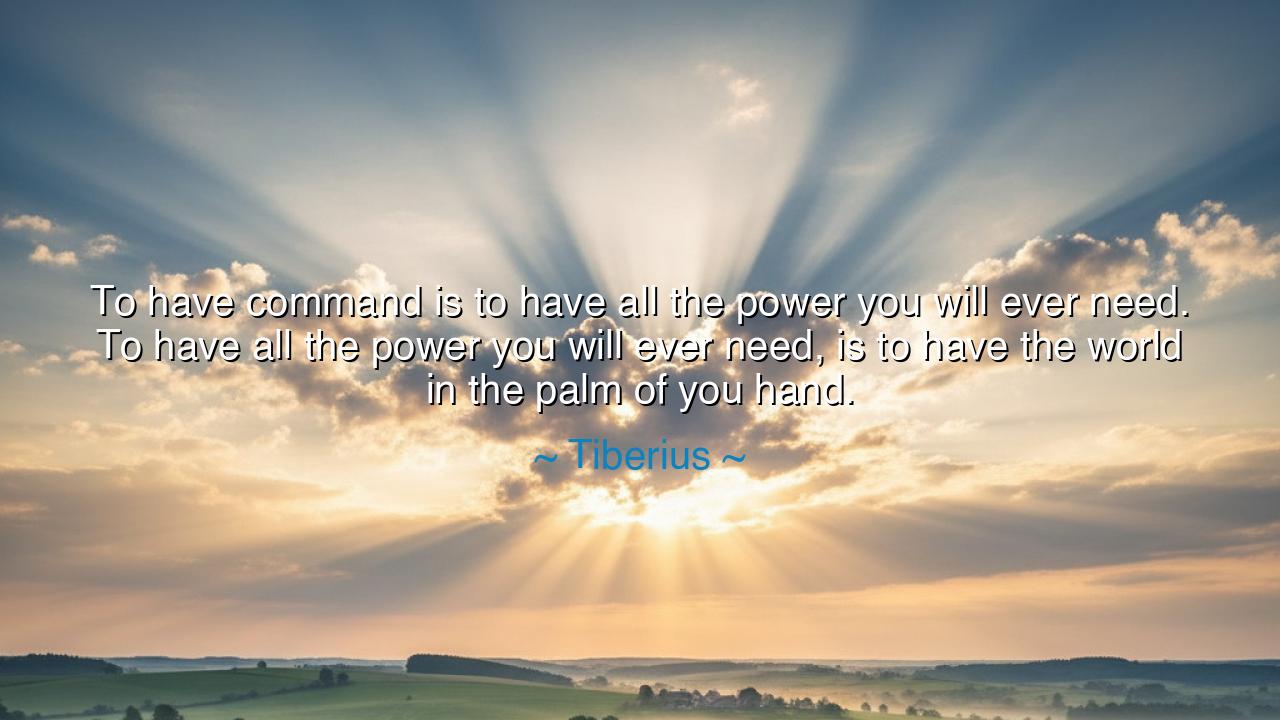
To have command is to have all the power you will ever need. To
To have command is to have all the power you will ever need. To have all the power you will ever need, is to have the world in the palm of you hand.






In the words of Tiberius, “To have command is to have all the power you will ever need. To have all the power you will ever need, is to have the world in the palm of your hand,” we hear the voice of empire distilled into a single truth. The Roman emperor speaks of command not as a mere office or title, but as the essence of dominion. To command is to wield authority over men, armies, and nations—to shape the course of events with words alone. It is the apex of human power, where one’s will bends the actions of thousands.
The power Tiberius speaks of is not physical strength, nor wealth, but the authority to direct others. This is the kind of power that built Rome itself, where generals and emperors ordered legions, carved roads, and dictated the laws of life and death. To possess such command was to carry the weight of the world, for the fate of nations rested upon a single voice. Yet it was also intoxicating, for with such power came the illusion of holding the earth itself “in the palm of your hand.”
History confirms the truth of his words. When Julius Caesar crossed the Rubicon, he did so not with vast treasure nor mystical weapons, but with command over loyal soldiers who would follow him into the heart of Rome. That command gave him power greater than the Senate itself, and with that power, he reshaped the destiny of the Republic. So too, Tiberius, his heir, knew that to direct men was to direct history.
But this wisdom carries also a warning. For command, once grasped, is a double-edged sword. To hold the world in your hand is also to hold its burdens. The same command that can bring glory can also summon ruin. Tiberius himself, though powerful, was haunted by suspicion and tyranny, showing that power without balance becomes a prison. The palm that closes too tightly upon the world risks crushing it—and itself.
Thus let this teaching endure: seek command not for vanity, but with reverence, for it is the greatest power a mortal may wield. To lead is to shape destiny, to lift nations or to cast them into ruin. Remember always that true strength lies not only in seizing the world, but in holding it wisely, lest the gift of power become the curse of downfall.






TTLy Tran Tran
Tiberius’ idea that command equates to having power and holding the world in your palm makes me question if true leadership is about power or influence. Does commanding others lead to a truly fulfilling life, or is power just a fleeting illusion? Can the pursuit of power distort one’s sense of purpose, or does it fuel the desire for greatness? What happens when the desire for command overpowers other values?
VD11a4 -Nguyen Viet Duc
Tiberius seems to suggest that ultimate power comes from command, but I wonder if real strength lies in empathy and understanding rather than domination. Does true command come from coercion, or can it be built on mutual respect and collaboration? In today’s interconnected world, can one person truly hold the world in their hands, or is collective action and shared responsibility the path to progress?
AT39. Pham Gia An Thu
Tiberius’ quote reflects an ancient view of power, but in today’s world, does command still give one the world? With so much power concentrated in so few hands, are those in command truly happy, or are they constantly battling with the cost of maintaining such power? Does this view of command as the ultimate end game lead to a balanced life, or does it perpetuate a cycle of conflict and emptiness?
TTThai Truc
Tiberius seems to equate power with ultimate control over life, but does that lead to true satisfaction or merely a desire for more dominance? If you have the world in your hands, do you own it, or does it end up owning you? Can true happiness exist when power is the ultimate goal, or does it blind us to the complexities and nuances of genuine human connection?
HKHoa K
Tiberius’ statement about having command being synonymous with ultimate power is an interesting perspective on leadership. But does it imply that power itself is the key to happiness or success? Does the concentration of power lead to more freedom, or does it create a sense of entrapment? Is the desire for complete control an illusion of strength, or does it reveal deeper insecurities about vulnerability?